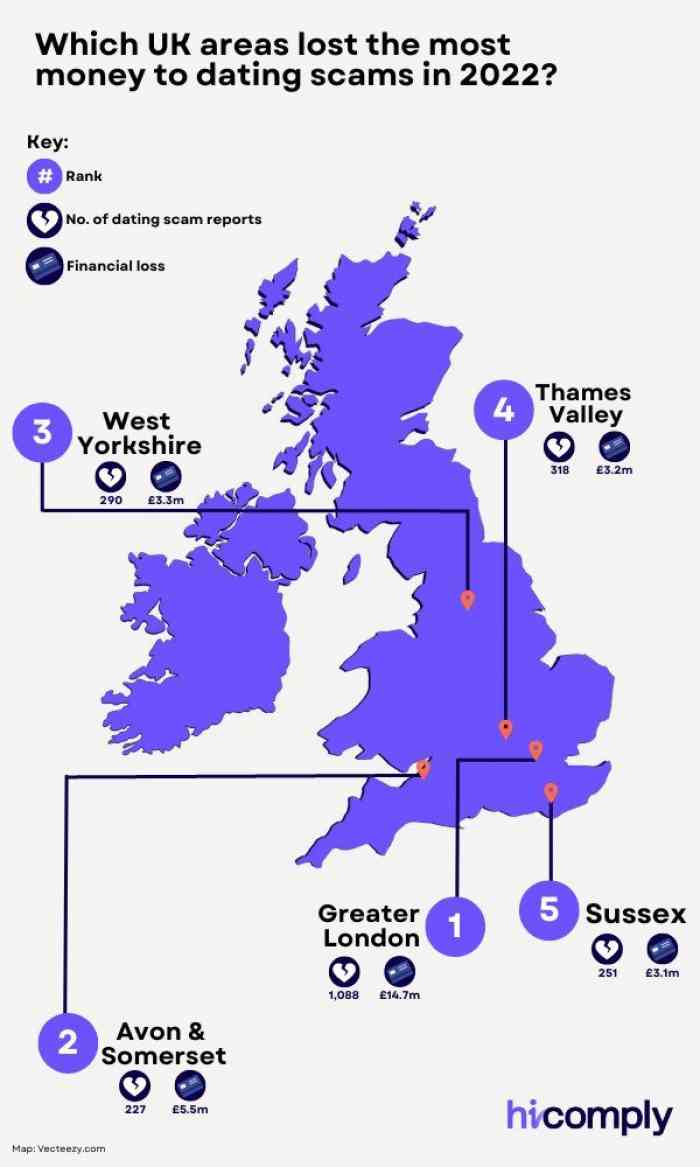Romance fraud decreased in 2022 – but Brits still lost £88m to dating scams
In 2022, 7,938 cases of romance fraud were reported to Action Fraud, with victims losing a reported £88m to scammers.
However, data obtained by the Hicomply team showed that UK dating fraud reports – and overall financial losses – decreased between 2021 and 2022.
In 2021, 8,700 reports were made and an eye-watering £97.2million was lost to scammers. By comparison, reports decreased by 11% in 2022 and financial loss decreased by 9.5%. Are Britons getting scam-savvier?
Most money lost in dating scams in 2022 by area
Scammers conned £14.7m out of Londoners, making up 16% of Britons’ total losses. Avon and Somerset, West Yorkshire, Thames Valley and Sussex rounded out the top five areas where residents lost the most money to dating scams.
Rank |
Police area |
Dating scams reported |
Total amount lost |
1 |
Greater London |
1,088 |
£14.7m |
2 |
Avon and Somerset |
227 |
£5.5m |
3 |
West Yorkshire |
290 |
£3.3m |
4 |
Thames Valley |
318 |
£3.2m |
5 |
Sussex |
251 |
£3.1m |

Data also revealed the areas with the most instances of dating fraud. Greater London (not including the City of London), saw the most reports with 1,088 - or 13% of total dating scam reports.
Highest number of dating scam reports in 2022 by area
Rank |
Police area |
Dating scams reported |
1 |
Greater London |
1,088 |
2 |
West Midlands |
328 |
3 |
Thames Valley |
318 |
4 |
West Yorkshire |
290 |
5 |
Hampshire |
277 |
Dating scam victim demographics
The 20-29 age group reported the most dating fraud scams, at 1,500. This was closely followed by 50-59-year-olds, with 1,400 reports, and 30-39-year-olds and 40-49-year-olds with 1,300 reports each – but even 90-99-year-olds had reported 15 dating fraud scams!
Highest number of dating scam reports in 2022 by age group
Rank |
Age group |
Number of dating scams reported |
1 |
20-29 |
1,500 |
2 |
50-59 |
1,300 |
3 |
30-39 |
1,300 |
4 |
40-49 |
1,300 |
5 |
60-69 |
1,100 |
6 |
70-79 |
719 |
7 |
10-19 |
385 |
8 |
80-89 |
164 |
9 |
90-99 |
15 |
When were the most scams reported?
On average, 662 scams were reported to Action Fraud per month. Notable exceptions include May 2022, where 767 scams were reported, and March 2022, where 583 scams were reported. However, the number of scams reported did not reflect financial losses – Brits lost almost double the amount of money in June, at £12.6m with 668 reports, compared to May, at £6.5m with 767 reports.
Rank |
Month |
Scams reported |
Financial loss |
1 |
May |
767 |
£6,542,243 |
2 |
January |
684 |
£6,431,942 |
=3 |
April |
671 |
£7,629,005 |
=3 |
February |
671 |
£6,734,147 |
5 |
June |
668 |
£12,557,552 |
Finally, team Hicomply looked at data on dating apps using information obtained via a FOI request to Action Fraud. Overall, the number of reports including references to dating apps dropped from 1,060 in 2021 to 889 in 2022, a 16% decrease. The number of reports referencing Tinder and Grindr reduced noticeably – Tinder saw a 33% decrease in mentions and Grindr 32%, but Bumble and Hinge saw increases, at 60% and 58% respectively.
Dating scam reports referencing dating apps: 2021 vs 2022
App |
Reports 2021 |
Reports 2022 |
Difference |
Bumble |
38 |
61 |
23 (+60%) |
Hinge |
86 |
136 |
50 (+58%) |
eHarmony |
7 |
8 |
1 (+14%) |
Plenty of Fish |
220 |
203 |
17 (-8%) |
OkCupid |
18 |
16 |
2 (-11%) |
Grindr |
53 |
36 |
17 (-32%) |
Tinder |
638 |
429 |
209 (-33%) |
The above dating apps also accounted for just 11% of dating scam reports in 2022, likely due to the stricter measures apps are bringing in to verify user identities and prevent scams and catfishing.
Dr. Meera Sarma, CEO at cybersecurity solutions provider Cystel, shared insights on what the future of scams leveraging single Britons’ vulnerabilities might look like: “While on the surface the overall percentage of dating scams appear to be on a downward trend, the depth of crimes – use of dating platforms to spread disinformation, use of AI to create deepfakes and a trail of deep webs on social media to create a false sense of trust – is on the rise.
“Scammers are turning to the dark web for ready-to-use tools, often selling information from the scams back to hackers on the dark web. In the past, users were advised to look to look for digital footprints of an individual for confirmation of authenticity, however, this is no longer sufficient. If you are using dating apps, avoid:
- Clicking on any innocuous link, even if it is seeking support for a cause close to your heart, receiving a gift , tax relief or any form of support
- Relying on social media for confirmation of authenticity. Look for multiple sources for confirmation of identity, such as professional networks
- Offers of tools/apps or websites that offer quick financial gains
“As we move towards a world of DNA matched dating and dating in AR/VR platforms, financial security, identity and privacy concerns are likely to remain.”
If you think you have been a victim of a romance scam, you should contact your bank immediately and report it to Action Fraud on 0300 123 2040 or via actionfraud.police.uk.
Data sources
- NFIB Fraud and Cyber Crime Dashboard - data for reports by police area, financial loss by police area, victim age demographics and gender, data accurate as accessed on 6/2/2022
- FOI request to Action Fraud - data for number of reports 2021 vs 2022, financial loss (overall) and dating app mentions.



